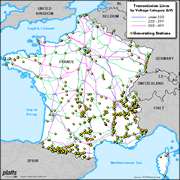National Energy Grid
|
 |
|
Full Size Map National Electricity Transmission Grid of France(38 kb) |
GRID SUMMARY
French energy policy has been relatively consistent in recent decades, with the main objectives including: securing energy supply, achieving international competitiveness, and protecting the environment. The focus on energy security has led France to become one of the world's top producers and consumers of nuclear power. However, the French government has recently organized a national energy policy debate, which will focus on energy sources for the next thirty years, particularly the status of nuclear power and the future of renewables.
France is highly dependent on oil imports. In 2002, France imported about 1.85 million barrels per day (bbl/d) of its approximate 1.96 million bbl/d oil consumption. France has oil reserves totaling only 148 million barrels as of January 2003. France's domestic crude oil production comes from numerous small-sized wells, with total crude production of 26,900 bbl/d.
Despite France's limited domestic oil reserves and production, the French oil industry is an important actor in world energy markets. Major oil assets of French oil companies are located in the North Sea, Africa, and Latin America. French imports come primarily from Saudi Arabia and Norway, followed by the United Kingdom, Iraq, Iran, Nigeria, and Russia.
In early 1999, French oil company Total merged with Belgian oil company Petrofina to create TotalFina, the world's sixth-largest oil company and the third-largest oil company in Europe. In 2000, TotalFina merged with Elf Aquitaine to create TotalFinaElf. After the deal was completed, TotalFinaElf became the fourth-largest publicly listed oil company in the world, after ExxonMobil, Royal Dutch/Shell, and BP. The company has proven reserves of about 10.8 billion barrels of oil equivalent (boe) and production of about 2.1 million boe/d. TotalFinaElf aims to increase hydrocarbon production by nearly 40% by 2005. The company owns more than 50% of the refinery capacity in France, and is the seventh-largest refiner in the world.
During the 1990s, Total and Elf Aquitaine reportedly negotiated with Iraq on development rights for the Majnoon and Nahr Umr oil fields. Majnoon is the largest of Iraq's oilfields slated for post-sanctions development, with reserves of 12-30 billion barrels. In July 2001, angered by France's perceived support for the U.S. "smart sanctions" plan, Iraq announced that it would no longer give French companies priority in awarding oil contracts, and would reconsider existing contracts as well.
In 2002, TotalFinaElf joined nine other companies in supporting the construction of the Baku-Tbilisi-Ceyhan oil pipeline project. The 1,100-mile route will carry oil from a terminal near Baku to the port of Ceyhan on the Mediterranean coast. The pipeline will be capable of carrying over one million barrels of oil per day, and should be completed by 2005.
ENERGY SUMMARY : FRANCE
Map
of French Electricity Grid | National Energy Grid Index
GENI Home Page | Contact
GENI | Subscribe
to GENI Newsletter | Pledge
| Comments
| GENI Forum
Email this page to a friend
If you speak another language fluently and you liked this page, make
a contribution by translating
it! For additional translations check out FreeTranslation.com
(Voor vertaling van Engels tot Nederlands)
(For oversettelse fra Engelsk til Norsk)
(Для дополнительных
переводов проверяют
FreeTranslation.com )

